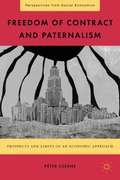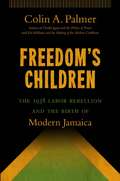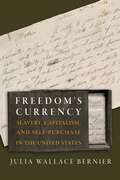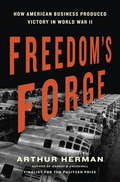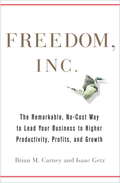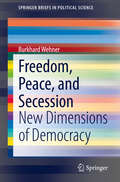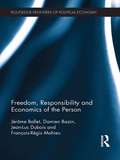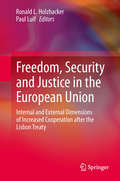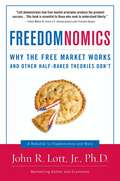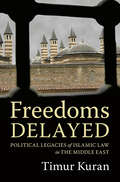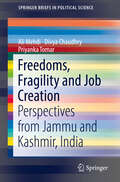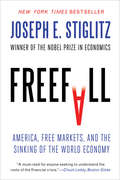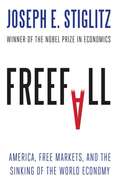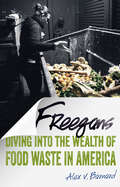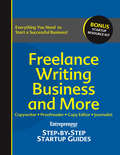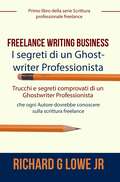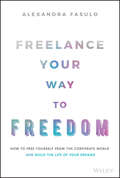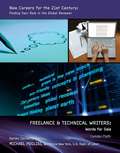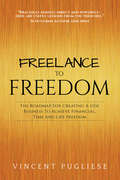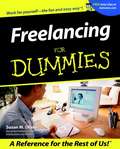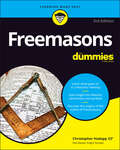- Table View
- List View
Freedom of Contract and Paternalism: Prospects and Limits of an Economic Approach (Perspectives from Social Economics)
by Péter CserneA theoretical discussion and internal critique of mainstream law and economics scholarship, especially as it approaches the issue of paternalism. Cserne discusses how, and to what extent, economic analysis can explain and/or justify the limitations on freedom of contract, with special emphasis on paternalism.
Freedom's Children
by Colin A. PalmerFreedom's Children is the first comprehensive history of Jamaica's watershed 1938 labor rebellion and its aftermath. Colin Palmer argues that, a hundred years after the abolition of slavery, Jamaica's disgruntled workers challenged the oppressive status quo and forced a morally ossified British colonial society to recognize their grievances. The rebellion produced two rival leaders who dominated the political life of the colony through the achievement of independence in 1962. Alexander Bustamante, a moneylender, founded the Bustamante Industrial Trade Union and its progeny, the Jamaica Labour Party. Norman Manley, an eminent barrister, led the struggle for self-government and with others established the People's National Party. Palmer describes the ugly underside of British colonialism and details the persecution of Jamaican nationalists. He sheds new light on the nature of Bustamante's collaboration with the imperial regime, the rise of the trade-union movement, the struggle for constitutional change, and the emergence of party politics in a modernizing Jamaica.
Freedom's Currency: Slavery, Capitalism, and Self-Purchase in the United States
by Julia Wallace BernierThe first comprehensive study of self-purchase in the United States from the American Revolution to the Civil WarEnslaved people lived in a world in which everything had a price. Even freedom. Freedom’s Currency follows enslaved people’s efforts to buy themselves out of slavery across the United States from the American Revolution to the Civil War. In the first comprehensive study of self-purchase in the nation, Julia Wallace Bernier reveals how enslaved people raised money, fostered connections, and made use of slavery’s systems of value and exchange to wrest control of their lives from those who owned them. She chronicles the stories of famous fugitives like Frederick Douglass, who, with the help of friends and supporters, purchased his freedom to protect himself against the continued legal claims of his enslavers and the possibility of recapture. She also shows how enslaved fathers like Lunsford Lane and mothers like Elizabeth Keckley tried to secure lives for their families outside of slavery.Freedom’s Currency argues that freedom played a central role in the social and economic lives of the enslaved and in the ways that these aspects of their lives overlapped. This intimate portrait of community illuminates the complexity of enslaved people’s ideas about their place at the intersection of slavery and American capitalism and their attempts to value freedom above all. Given the stakes—liberation or remaining enslaved—it is an account of both triumph and devastating failure.
Freedom's Forge: How American Business Produced Victory in World War II
by Arthur HermanNEW YORK TIMES BESTSELLER * SELECTED BY THE ECONOMIST AS ONE OF THE BEST BOOKS OF THE YEARRemarkable as it may seem today, there once was a time when the president of the United States could pick up the phone and ask the president of General Motors to resign his position and take the reins of a great national enterprise. And the CEO would oblige, no questions asked, because it was his patriotic duty. In Freedom's Forge, bestselling author Arthur Herman takes us back to that time, revealing how two extraordinary American businessmen--automobile magnate William Knudsen and shipbuilder Henry J. Kaiser--helped corral, cajole, and inspire business leaders across the country to mobilize the "arsenal of democracy" that propelled the Allies to victory in World War II. "Knudsen? I want to see you in Washington. I want you to work on some production matters." With those words, President Franklin D. Roosevelt enlisted "Big Bill" Knudsen, a Danish immigrant who had risen through the ranks of the auto industry to become president of General Motors, to drop his plans for market domination and join the U.S. Army. Commissioned a lieutenant general, Knudsen assembled a crack team of industrial innovators, persuading them one by one to leave their lucrative private sector positions and join him in Washington, D.C. Dubbed the "dollar-a-year men," these dedicated patriots quickly took charge of America's moribund war production effort. Henry J. Kaiser was a maverick California industrialist famed for his innovative business techniques and his can-do management style. He, too, joined the cause. His Liberty ships became World War II icons--and the Kaiser name became so admired that FDR briefly considered making him his vice president in 1944. Together, Knudsen and Kaiser created a wartime production behemoth. Drafting top talent from companies like Chrysler, Republic Steel, Boeing, Lockheed, GE, and Frigidaire, they turned auto plants into aircraft factories and civilian assembly lines into fountains of munitions, giving Americans fighting in Europe and Asia the tools they needed to defeat the Axis. In four short years they transformed America's army from a hollow shell into a truly global force, laying the foundations for a new industrial America--and for the country's rise as an economic as well as military superpower. Featuring behind-the-scenes portraits of FDR, George Marshall, Henry Stimson, Harry Hopkins, Jimmy Doolittle, and Curtis LeMay, as well as scores of largely forgotten heroes and heroines of the wartime industrial effort, Freedom's Forge is the American story writ large. It vividly re-creates American industry's finest hour, when the nation's business elites put aside their pursuit of profits and set about saving the world.Praise for Freedom's Forge "A rambunctious book that is itself alive with the animal spirits of the marketplace."--The Wall Street Journal "A rarely told industrial saga, rich with particulars of the growing pains and eventual triumphs of American industry . . . Arthur Herman has set out to right an injustice: the loss, down history's memory hole, of the epic achievements of American business in helping the United States and its allies win World War II."--The New York Times Book Review "Magnificent . . . It's not often that a historian comes up with a fresh approach to an absolutely critical element of the Allied victory in World War II, but Pulitzer finalist Herman . . . has done just that."--Kirkus Reviews (starred review)From the Hardcover edition.
Freedom, Inc.: Free Your Employees and Let Them Lead Your Business to Higher Productivity, Profits, and Growth
by Brian M. Carney Isaac GetzThe authors recommend a radical departure from the traditional command-and-control structures and policies often found in the business world: setting employees free to use their initiative and risk-taking instincts in a trusting, nonhierarchical environment. In order to prove that liberated workers lead to measurable increases in profits, the authors offer profiles of visionary leaders at real companies such as Harley-Davidson. Carney is editorial page editor of the Wall Street Journal Europe. Getz is affiliated with the ESCP Europe Business School. Annotation ©2010 Book News, Inc. , Portland, OR (booknews. com)
Freedom, Peace, and Secession: New Dimensions of Democracy (SpringerBriefs in Political Science)
by Burkhard WehnerThis book adopts a long-term perspective to consider political self-determination, peacekeeping and the creation of political meaning. It analyzes problems in the nation-state system and assesses current issues regarding separatism and secession movements. Drawing on extensive research in the fields of political theory, democracy studies and social welfare, the book develops a framework of new rules on a fundamental level that can help nations overcome conflicts concerning borders and nationalities.
Freedom, Repression, and Private Property in Russia
by Vladimir Shlapentokh Anna ArutunyanThis study demonstrates how the emergence of private property and a market economy after the Soviet Union's collapse enabled a degree of freedom while simultaneously supporting authoritarianism. Based on case studies, Vladimir Shlapentokh and Anna Arutunyan analyze how private property and free markets spawn feudal elements in society. These elements are so strong in post-Communist Russia that they prevent the formation of a true democratic society, while making it impossible to return to totalitarianism. The authors describe the resulting Russian society as having three types of social organization: authoritarian, feudal, and liberal. The authors examine the adaptation of Soviet-era institutions like security forces, police, and the army to free market conditions and how they generated corruption; the belief that the KGB was relatively free from corruption; how large property holdings merge with power and necessitate repression; and how property relations affect government management and suppression.
Freedom, Responsibility and Economics of the Person (Routledge Frontiers of Political Economy #175)
by Jérôme Ballet Damien Bazin Jean-Luc Dubois François-Régis MahieuThe capability approach has developed significantly since Amartya Sen was awarded the Nobel Prize in Economics in 1998. It is now recognised as being highly beneficial in the analysis of poverty and inequality, but also in the redefinition of policies aimed at improving the well-being of individuals. The approach has been applied within numerous sectors, from health and education to sustainable development, but beyond the obvious interest that it represents for the classical economics tradition, it has also encountered certain limitations. While acknowledging the undeniable progress that the approach has made in renewing the thinking on the development and well-being of a population, this book takes a critical stance. It focuses particularly on the approach’s inadequacy vis-à-vis the continental phenomenological tradition and draws conclusions about the economic analysis of development. In a more specific sense, it highlights the fact that the approach is too bound by standard economic logic, which has prevented it from taking account of a key ‘person’ dimension — namely, the ability of an individual to assume responsibility. As a result, this book advocates the notion that if the approach is used carelessly in relation to development policies, it can cause a number of pernicious effects, some of which may lead to disastrous consequences. Due to its multidisciplinary nature, this book will be of interest to those working in the fields of economics, philosophy, development studies and sociology.
Freedom, Security, and Justice in the European Union: Internal and External Dimensions of Increased Cooperation after the Lisbon Treaty
by Ronald L. Holzhacker Paul LuifAs the European Union has evolved, it has also begun to address policy questions which are closer to the very heart of the state. From cooperation in Justice and Home Affairs, originally conceived as the third pillar of European cooperation, has emerged the Area of Freedom, Security, and Justice (AFSJ). A unique aspect of policy in this area is the desire to integrate the internal and external dimensions of this policy area. One of the tensions in this policy area has been balancing the protection of fundamental rights and increasing security. The first part of this book focuses on the institutional relations of policymaking in AFSJ, both within member states and between member states, in particular the issues of national executive control, national parliamentary scrutiny and peer review across the member states with regard to AFSJ. The second part focuses on specific policy areas which are part of AFSJ. Two chapters highlight the tension found in this policy area between security and human or fundamental rights, the first related to data retention and the second on policing external borders. The final two chapters are concerned with data exchange among European countries and transatlantically with the US, and the interface between AFSJ and the Common Foreign and Security Policy (CFSP). The chapters contained in the book were presented at the Dutch Ministry of the Interior and Kingdom Relations and the Dutch national parliament (Tweede Kamer), making it of interest to scholars and practitioners alike.
Freedomnomics: Why the Free Market Works and Other Half-baked Theories Don't
by John R. Lott Jr.How free-market economies really work(and why they work so well)Are free market economies really based on fleecing the consumer? Is the U.S. economy truly just a giant free-for-all that encourages duplicity in our everyday transactions? Is everyone from corporate CEOs to your local car salesman really looking to make a buck at your expense?In Freedomnomics: Why the Free Market Works and Other Half-Baked Theories Don't,economist and bestselling author John R. Lott, Jr., answers these and other common economic questions, bravely confronting the profound distrust of the market that the bestselling book Freakonomics has helped to popularize. Using clear and hard-hitting examples, Lott shows how free markets liberate the best, most creative, and most generous aspects of our society--while efforts to constrain economic liberty, no matterhow well-intentioned, invariably lead to increased poverty and injustice. Extendingits rigorous economic analysis even further to our political and criminal justicesystems, Freedomnomics reveals:? How the free market creates incentives for people to behave honestly? How political campaign restrictions keep incumbents in power? Why legalized abortion leads to family breakdown, which creates more crime? Why affirmative action in police departments leads to higher crime rates? How women's suffrage led to a massive increase in the size of government· Why women become more conservative when they get married and moreliberal when they get divorced? How secret ballots reduce voter participation? Why state-owned companies and government agencies are much more likely to engage in unfair predation than are private firms? Why the controversial assertions made in the trendy book Freakonomics are almost entirely wrongEntertaining, persuasive, and based on dozens of economic studies spanning decades, Freedomnomics not only shows how free markets really work--but proves that, when it comes to promoting prosperity and economic justice, nothing works better.
Freedoms Delayed: Political Legacies of Islamic Law in the Middle East
by Timur KuranAccording to diverse indices of political performance, the Middle East is the world's least free region. Some believe that it is Islam that hinders liberalization. Others retort that Islam cannot be a factor because the region is no longer governed under Islamic law. This book by Timur Kuran, author of the influential Long Divergence, explores the lasting political effects of the Middle East's lengthy exposure to Islamic law. It identifies several channels through which Islamic institutions, both defunct and still active, have limited the expansion of basic freedoms under political regimes of all stripes: secular dictatorships, electoral democracies, monarchies legitimated through Islam, and theocracies. Kuran suggests that Islam's rich history carries within it the seeds of liberalization on many fronts; and that the Middle East has already established certain prerequisites for a liberal order. But there is no quick fix for the region's prevailing record of human freedoms.
Freedoms, Fragility and Job Creation: Perspectives From Jammu And Kashmir, India (SpringerBriefs in Political Science)
by Ali Mehdi Divya Chaudhry Priyanka TomarThis book argues that inequality of basic freedoms—economic, political, sociocultural—is a central cause of fragility and challenge to job creation in fragile geopolitical situations. It is based on extensive official data and stakeholder interactions in the conflict-ridden Indian border state of Jammu and Kashmir, and involves a case study research methodology. This is the first book which invokes the philosophical perspective of freedom to analyze two of the most pressing challenges of our time—fragility and job creation—and, as such, makes a fundamental contribution to both strands of academic and policy literature. From this perspective, development in the sense of freedoms—particularly the enhancement of human agency through jobs—should be a central strategy in tackling fragility. Most literature on Indian Kashmir has been emotional or political in nature, lacking the serious yet interesting multidisciplinary focus presented here—which is a historical assessment of Kashmir’s political economy, economic indices, employment patterns, challenges of infrastructure and human capital. Ending with a set of long-, medium- and immediate-term policy recommendations to address the challenge of jobs in the state, this is the only book on Indian Kashmir which is at once philosophical, social-scientific and policy-oriented in nature. Academics in development studies, regional development, political science and international relations, international organizations working in fragile regions around the world, national and international policymakers, the private sector, civil society, media as well as ordinary readers interested in the issue of Kashmir will find it engaging and useful.
Freefall: America, Free Markets, and the Sinking of the World Economy
by Joseph E. StiglitzAn incisive look at the global economic crisis, our flawed response, and the implications for the world's future prosperity. The Great Recession, as it has come to be called, has impacted more people worldwide than any crisis since the Great Depression. Flawed government policy and unscrupulous personal and corporate behavior in the United States created the current financial meltdown, which was exported across the globe with devastating consequences. The crisis has sparked an essential debate about America's economic missteps, the soundness of this country's economy, and even the appropriate shape of a capitalist system. Few are more qualified to comment during this turbulent time than Joseph E. Stiglitz. Winner of the 2001 Nobel Prize in Economics, Stiglitz is "an insanely great economist, in ways you can't really appreciate unless you're deep into the field" (Paul Krugman, New York Times). In Freefall, Stiglitz traces the origins of the Great Recession, eschewing easy answers and demolishing the contention that America needs more billion-dollar bailouts and free passes to those "too big to fail," while also outlining the alternatives and revealing that even now there are choices ahead that can make a difference. The system is broken, and we can only fix it by examining the underlying theories that have led us into this new "bubble capitalism." Ranging across a host of topics that bear on the crisis, Stiglitz argues convincingly for a restoration of the balance between government and markets. America as a nation faces huge challenges--in health care, energy, the environment, education, and manufacturing--and Stiglitz penetratingly addresses each in light of the newly emerging global economic order. An ongoing war of ideas over the most effective type of capitalist system, as well as a rebalancing of global economic power, is shaping that order. The battle may finally give the lie to theories of a "rational" market or to the view that America's global economic dominance is inevitable and unassailable. For anyone watching with indignation while a reckless Wall Street destroyed homes, educations, and jobs; while the government took half-steps hoping for a "just-enough" recovery; and while bankers fell all over themselves claiming not to have seen what was coming, then sought government bailouts while resisting regulation that would make future crises less likely, Freefall offers a clear accounting of why so many Americans feel disillusioned today and how we can realize a prosperous economy and a moral society for the future.
Freefall: America, Free Markets, and the Sinking of the World Economy
by Joseph StiglitzWriting for a non-specialist audience, Nobel Prize-winning economist Stiglitz (Columbia U.) offers his analysis of the flawed policies pushed by market fundamentalists that led to the "Great Recession" that began in 2008. He provides a wide-ranging discussion that both identifies the causes of the economic crisis and evaluates the response to it, focusing on the housing bubble and the failure to properly regulate finance. He also considers solutions to both the present crisis and ongoing economic balances within the United States and around the world. Those familiar with Stiglitz will find few major surprises, while those unfamiliar with his work can expect a broadly Post-Keynesian approach to the issues at hand.
Freegans: Diving into the Wealth of Food Waste in America
by Alex V. BarnardIf capitalism is such an efficient system, why does 40 percent of all U.S. food production go to waste—while one in six people in the nation face hunger? This startling truth has stirred increasing interest and action of late, but none so radical as that of the freegans, who live on what capitalism throws away—including food culled from supermarket dumpsters. Freegans is a close look at the people in this movement, offering a broader perspective on ethical consumption and the changing nature of capitalism.Freegans object to the overconsumption and environmental degradation on which they claim our economic order depends, and they register that dissent by opting out of it, recovering, redistributing, and consuming wasted goods, from dumpster-dived food to cast-off clothes and furniture. Through several years of fieldwork and in-depth interviews with freegans in New York City, Alex Barnard has created a portrait of freegans that leads to questions about ethical consumption—like buying organic, fair trade, or vegan—and the search for effective forms of action in an era of political disillusionment.Barnard&’s analysis of this pressing concern reveals how waste is integrally bound up with our food system. At the same time, by showing that markets do not seamlessly translate preferences expressed at the cash register into changes in production, Freegans exposes the limits of consumer activism.
Freelance Writing Business
by Entrepreneur MagazineAre you ready to free yourself from commuter traffic, office hours and boring writing projects? Then it's time to take your writing career into your own hands-and start your professional freelance writing business! One of the fastest and least expensive homebased businesses to start, the business of freelance writing lets you turn your writing talent into professional independence-set your own hours, choose your own projects and take charge of your income! This complete guide arms you with all you need to know to not only start your freelance writing business but to make sure it's a success. Learn how to:Start your business instantly and for little moneyOperate your business using freelance business basics and rulesChoose your writing nicheUse your writing expertise to advertise and find clientsIncrease your income by improving your writing skills and expanding your client baseStart your freelance writing business today-and begin earning income tomorrow!
Freelance Writing Business - I segreti di un Ghostwriter Professionista
by Richard G Lowe Jr Cristina MantionePensi di poter diventare uno scrittore freelance e vorresti di lavorare per gli altri. Beh, il ghostwriting è un lavoro duro! Tuttavia, quando è gestito propriamente, il ghostwriting può rivelarsi uno dei lavori freelance più redditizi, nel campo della scrittura. Questo manuale illustra i passaggi necessari per gestire con successo un progetto di ghostwriting, dai primi contatti con un potenziale cliente fino alla consegna del progetto completo. Analizzerà in dettaglio le potenziali insidie, insieme a suggerimenti e soluzioni. Inoltre, tratterà questi argomenti: * Stabilire il prezzo di un progetto di ghostwriting * Iniziare questo lavoro * Gestire le riunioni con il cliente * Effettuare interviste e ricerche * Perchè la comunicazione è particolarmente importante * Redigere uno Stato Avanzamento dei Lavori per tutelare te stesso e il tuo cliente * Gestire le revisioni * Consegnare il progetto
Freelance Your Way to Freedom: How to Free Yourself from the Corporate World and Build the Life of Your Dreams
by Alexandra FasuloMaster the new realities of work with this step-by-step guide to freelancing In Freelance Your Way to Freedom: How to Free Yourself from the Corporate World and Build the Life of Your Dreams, freelancing phenomenon Alex Fasulo delivers a practical, step-by-step guide to navigating the potential and perils of launching your very own side hustle. In the book, the author draws on her own experience transforming a $36,000/year Fiverr side hustle into a million-dollar enterprise. She explains how to manage those critical moments in business when decisions need to be made quickly and without warning. You&’ll find concrete tips and hands-on examples to make the gig economy work for you, Freelance Your Way to Freedom also includes: The good, the bad, and the ugly about the new work economy Relatable struggles, mindset challenges, and a woman&’s perspective on solopreneurship Anecdotes and examples that show you how to apply the advice and guidance contained within A can&’t-miss handbook for freelancers, solopreneurs, and entrepreneurs, Freelance Your Way to Freedom belongs on the bookshelves of anyone participating or interested in the new world of work.
Freelance and Technical Writers: Words for Sale
by Camden FlathYou've probably heard a lot about ways you can conserve energy by changing the type of light bulbs you buy, driving a hybrid vehicle, or recycling your garbage. These are all important ways to help solve the world's energy crisis, but did you ever consider a more direct contribution? Choosing a career in green energy could be a way to help the world and be part of an exciting and fulfilling new field. The young adults of today will be the job force of tomorrow, so choosing a career that will best fit with the needs of the changing world will be important to job satisfaction and a successful life. With the vast array of career and job options, it will also be important for young adults to understand which work will be the best match for their interests, talents, goals, and personality types. Certain careers are expected to gain importance within the early decades of the twenty-first century. Many occupations related to green or renewable energy are on track to grow faster than the average rate for all occupations. "We know the country that harnesses the power of clean, renewable energy will lead the twenty-first century," said President Barack Obama in an address to Congress on February 24, 2009. If you choose a career in green energy, you too will be one of the future's leaders!
Freelance to Freedom: The Roadmap for Creating a Side Business to Achieve Financial, Time and Life Freedom
by Vincent PuglieseVincent and his wife were stuck in dead end newspaper photography jobs, in debt, stressed, with a baby on the way while making $15 an hour. After winning the highest award in his field, Vincent was offered a 3 percent raise. He knew at that moment he needed a monumental change. One month away from their baby being born, Vincent and Elizabeth started a side photography business out of desperation. In less than four years, they grew their business to pay off all of their debt, including their home, and left their jobs for a life of freedom. With the world moving rapidly towards a freelance model, Freelance to Freedom is not only timely and necessary, but it’s also entertaining, engaging and paints a picture for anyone looking for a life of freedom with money, time and location.
Freelancer, Ltd.
by Karim R. Lakhani Christopher Stanton Jin Hyun Paik Jennifer L. Hoffman Nina CohodesOver the course of the 2010s, the rapid advancement of mobile technologies and the rise of online freelancing platforms seemed to portend a radical transformation of labor markets into on-demand, flexible talent pools. Even though several Fortune 500 companies-including Microsoft, Samsung, and General Electric-embraced digital labor solutions, enterprise adoption lagged far behind smaller businesses and startups. Despite the promising potential benefits, concerns persisted about navigating labor regulations, ensuring appropriate vetting, and guaranteeing the quality of work. Sarah Tang, the newly appointed Vice President of Enterprise at Freelancer, Ltd., took on the challenge of crafting the growth strategy, operations, and sales of Freelancer's services to Fortune 500 companies. What it would take to convince more enterprises of the potential of on-demand freelance labor that could help them hire skilled freelancers in volume or in multiple countries simultaneously? What did the future hold for open work practices between enterprises and digital labor markets?
Freelancing For Dummies (For Dummies Ser.)
by Susan M. DrakeAre you ready to fly the corporate coop and become the boss of you? Do you dream of busting out of the cubicle wasteland and finding greener pastures as a freelancer? If so, you’re in good company. The U S Department of Labor estimates that nearly one-fourth of the American workforce is self-employed and that number is sure to increase over the next decade. But do you have what it takes to succeed as a freelancer, consultant, or contract employee? Do you even know what it takes to make it on your own? Here’s your chance to find out. A total guide to starting and running a freelance business, Freelancing For Dummies is for anyone thinking about striking out on their own, or who’s already decided to make the move into self-employment. It’s also an excellent resource for established freelancers looking for ways to jumpstart their businesses. Written by a top corporate communication consultant, it features hard-won tips from a slew of successful freelancers, including an accountant, a wr iter, a computer trainer, a graphic designer, a market researcher, an event planner, a medical trainer and others who share what they know about how to: Organize your home office and budget your time Create the ideal working environment Evaluate jobs and projects Land new business and manage client relationships Manage your money and pay your taxes Stay positive and manage the emotional uncertainties of self-employment Here’s your chance to take the leap from employee to boss with minimal stress and minimal sweat. A survival guide to building a successful freelance career, Freelancing For Dummies features: Self-assessments to gauge your skills and personality Critical “Get in, get out” information A gold mine of checklists, tear-out sheets, and sample forms Top ten lists War stories from freelancers who’ve made it Do you long for the freedom of being your own boss? Relax and let expert Susan Drake help you make the transition to becoming a fulltime freelancer.
Freemark Abbey Winery
by William S. KraskerFreemark Abbey must decide whether to harvest in view of the possibility of rain. Rain could damage the crop but delaying the harvest would be risky. On the other hand, rain could be beneficial and greatly increase the value of the resulting wine. This decision is further complicated by the fact that ripe Riesling grapes can be vinified in two ways, resulting in two different styles of wine. Their relative prices would depend on the uncertain preference of consumers two years later, when the wine is bottled and sold.
Freemark Abbey Winery (Abridged)
by William S. KraskerFreemark Abbey must decide whether to harvest in view of the possibility of rain. Rain could damage the crop but delaying the harvest would be risky. On the other hand, rain could be beneficial and greatly increase the value of the resulting wine. This decision is further complicated by the fact that ripe Riesling grapes can be vinified in two ways, resulting in two different styles of wine. Their relative prices would depend on the uncertain preference of consumers two years later, when the wine is bottled and sold.
Freemasons For Dummies
by Christopher HodappUnravel the mysteries of the Masons All the myths and rumors about Masonic organizations probably have you wondering "what do Masons really do?" Questions like this one are a natural by-product of being the oldest and largest "secret society" in the world. This book is an ideal starting place to find answers to your questions about the secret and not-so-secret things about Freemasonry. Now in its third edition, this international best-seller peeks behind the door of your local Masonic lodge and explains the meanings behind the rituals, rites, and symbols of the organization. Along the way the book covers nearly 3,000 years of Masonic history, introduces you to some famous Freemasons you already know from history books, and explains the relationship with related groups like Knights Templar, Scottish Rite, Order of Eastern Star, and the beloved fez-wearing Shriners. Look inside the book to learn: What it takes to become a member of the Freemasons, and what you can expect when you join How Lodges are organized and what really goes on during Masonic ceremonies The basic beliefs and philosophies of Freemasonry, including how Masons contribute to charity, and society in general The origins behind some of the wild myths and conspiracy theories surrounding Freemasonry and how to debunk (most of) them Written by a 33rd degree Scottish Rite Mason and the Public Relations and Marketing Director for the Grand Lodge F&AM of Indiana, Freemasons For Dummies is a must-read guide for anyone interested in this ancient fraternal order, whether you're looking to join or are just curious about some of the more mysterious aspects of Freemasonry.
